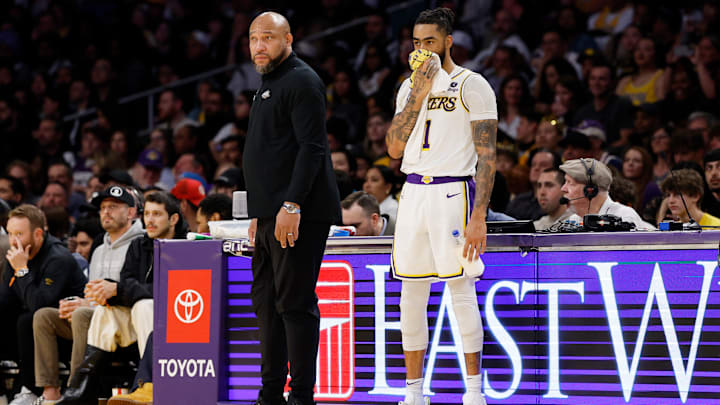The Los Angeles Lakers are entering the 2024 NBA offseason with a series of assumptions being made about potential outcomes. Chief among those beliefs is that LeBron James will re-sign with the Lakers and that JJ Redick will become the new head coach.
Equal in significance among those potential developments is the common belief that D'Angelo Russell has played his last game as a member of the Lakers organization.
Russell, 28, has a player option for the 2024-25 season worth just under $18.7 million. The former All-Star hasn't yet decided on how to proceed as far as his contract is concerned, but there could be a market for him in free agency should he opt to decline.
In the event that he accepts his player option, Russell could thrive under new Lakers leadership—a belief fueled by how his relationship with the previous head coach may have impacted his play.
Darvin Ham and D'Angelo Russell reportedly didn't see eye to eye
The Lakers parting ways with former head coach Darvin Ham has created a number of question marks about the negative areas of his influence. It's become clear, for instance, that he wasn't seeing eye-to-eye with many of the players, and Russell could be included on that list.
As such, it may be worth exploring the possibility of Russell showcasing what kind of progress he can make under a new head coach.
The Denver Nuggets seemingly have Russell's number up to this point, which caused a fair share of problems in Los Angeles. In 2023, Russell's poor play against the Nuggets in the Conference Finals resulted in Ham cutting the former All-Star's minutes in favor of Dennis Schröder.
Russell told Dave McMenamin of ESPN that Ham offered, "No dialogue," as that was happening. According to Shams Charania, Sam Amick, and Jovan Buha of The Athletic, that issue reared its head once more in 2023-24 when Ham benched Russell and Austin Reaves during the regular season.
The locker room seemingly took a morale hit in response to that controversial decision.
"The decision to bench both Reaves and Russell, the team’s consensus third- and fourth-best players, did not sit well with many within the organization and locker room, according to team and league sources."
If nothing else, that leads one to wonder if Ham could've done more to help Russell work through his postseason issues.
It's worth noting that Russell hasn't been exclusively bad during his postseason appearances. He's proven susceptible to some brutally poor showings, but he also helped the Lakers reach the Western Conference Finals just one season ago.
That includes scoring 31 points in a series-clinching win over the Memphis Grizzlies and the 19 points he scored to help Los Angeles close out the Golden State Warriors.
Unless the Lakers can find a player who moves the needle, parting ways with a productive point guard who has at least shown some signs of promise in the playoffs could be more harmful than beneficial
Finding a better player than Russell is easier said than done
Russell has struggled in the postseason, shooting 38.8 percent from the field and 32.7 percent from beyond the arc across 32 games played. It's the biggest reason why many believe the Lakers should move on from a player who has been unable to translate their regular season success to a bigger stage.
For as great as it sounds on paper to simply swap Russell out for a better fit, the reality is that it's far easier to hypothesize that outcome than it is to make it happen.
Russell is one of the most skilled and productive point guards in the NBA. He finished the 2023-24 regular season with averages of 18.0 points, 6.3 assists, 3.1 rebounds, and 3.0 three-point field goals made per game, shooting .456/.415/.828.
Russell ranked 10th in the NBA in three-point field goals made and was one of just eight players to knock down at least 200 three-point field goals at a clip of 40.0 percent or better.
Of those eight players, only two others averaged at least 15.0 points and 5.0 assists per game: Jalen Brunson and Stephen Curry. While Russell is far less of a proven commodity in the playoffs, it's still a reflection of the type of value the Lakers would be trying to replace this summer.
Obviously, the potential replacement doesn't need to provide the same type of statistics that Russell produces, but finding similar value isn't as easy as it seems.
If it doesn't work out, the contract is tradable
One of the biggest reasons to give Russell a chance in 2024-25 is his contract. $18.7 million is hardly a small amount, but it's an affordable contract for a player who provides the type of value that Russell has been able to generate.
In the event that another season of Russell playing in Los Angeles proves less than ideal, then he would have one of the most tradable contracts in the NBA.
$18.7 million is not only an accessible number in potential trade talks, but a one-year amount is always coveted around the deadline. Teams are often willing to part with first-round draft picks for high-level players on expiring deals, as well as players who could simply fit better elsewhere.
That might ultimately prove to be the Lakers' best path forward if Russell accepts his player option, as teams tend to be more desperate when the postseason is nearing than once it's concluded.
Beyond the expiring deals, in 2023-24, Terry Rozier, a comparable player to Russell, was sent to the Miami Heat in exchange for Kyle Lowry and a first-round draft pick. It's one of the countless examples of teams being willing to part with draft capital for established talent once they've begun to realize that their current group isn't getting the job done.
Considering how limited the Lakers' draft assets could be following potential trades this summer, that makes Russell an attractive asset both on the court and in potential negotiations.
